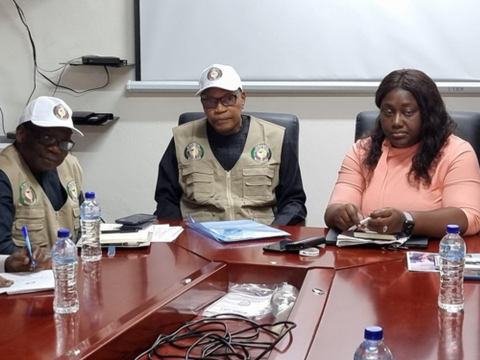By Saio Marrah
The preliminary report of the Economic Community of West African States (ECOWAS) Election Observation Mission to Sierra Leone states that 63 percent of 337 polling stations they visited during the June 24 General Elections, started late.
The delay was attributed to the late arrival of polling staff and materials.
The document published on Monday 26th June 2023, read out by the Head of the Mission, Mohamed Ibn Chambas Ph.D at a press conference held at the Bintumani Hotel in Freetown on the same day, indicated that at 37 polling stations visited, work commenced within the first hour.
More so, the report noted that despite the delays experienced at the opening, 52% of polling stations visited, closed on time. 13% of polling stations where voters were still waiting to vote were allowed to do so.
It also indicated that at a centre at SOS International School at Lumley Beach Road in Freetown, election materials did not arrive until after 8:45 a.m. and that even when they arrived the ballot boxes had no covers. That was said to have caused further delays which got some voters agitated.
The report however noted that the atmosphere at polling stations was generally peaceful with security agents present in 92 percent of stations visited.
“A notable incident occurred at the polling centre located at U.M.C. Primary School, Ropolor Road in Tonkolili, where the ballot paper issuer one (1) was only issuing ballots papers for the legislative election and not the presidential election. Chaos was ensured at around 11:45 a.m. when the APC District Youth Leader came and noticed the situation. The ensuing chaos led to security agents intervening and stopping the process,” it noted.
The report further indicated that on average, there were an average of five party agents present at polling centres visited, with the governing Sierra Leone People’s Party(SLPP) having a 98 percent presence and the main opposition, All People’s Congress, 94 percent.
Also, almost 98 percent of polling stations were set up in a way that guaranteed the secrecy of the vote and that in general, voters were required to present their voter’s card to cast their vote.
The report indicated that voting materials were generally available in sufficient quantities, but that in 7 percent of polling stations visited, there was one type of electoral materials or the other that was not available such as indelible ink, Reconciliation and Results Forms (RRF), Gender tally sheets, Tamper-Evidence Envelopes (TEEs), and inkpads.
With respect to inclusion, 63 percent of polling stations visited, were accessible to persons living with disability and there were tactile ballot jackets at 33 percent of polling stations.
The report indicated that in eight percent of polling stations visited, observers witnessed voters being allowed to vote without their voter’s card, but that such voters presented either their voter registration slip or other forms of identity that tallied with the details on the voter register.
“There were also cases, notably at Sierra Leone Grammar School in Aberdeen (Western Area Urban), Administrative Court in Kambia, and Port Loko Catholic Primary School (North-West Region), where voters who had voter’s cards could not find their names on the voters’ register and were thus not allowed to vote,” the report noted.
The report indicated that of polling stations visited, the lighting conditions when vote counting commenced, were adequate but as the process proceeded they deteriorated significantly and that “sorting and counting of the ballot papers was done at the polling stations and in clear view of party agents and observers.”
The mission noted that despite some early challenges, polling generally proceeded smoothly and in a largely peaceful atmosphere, and eligible voters were able to freely participate in the process.
ECOWAS was said to have deployed 95 observers in the 15 districts, 44 percent of them in urban and 56 percent in rural areas of Sierra Leone.
Copyright © 2023 Politico (28/06/23)








